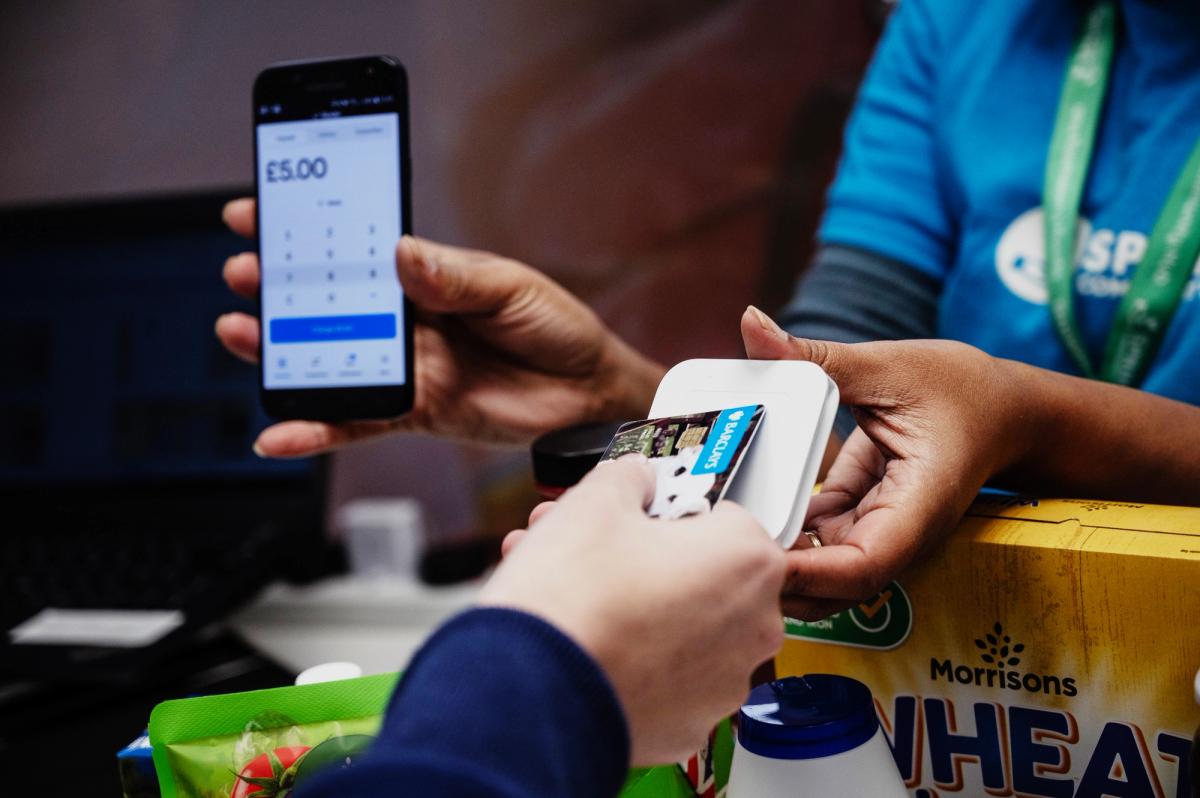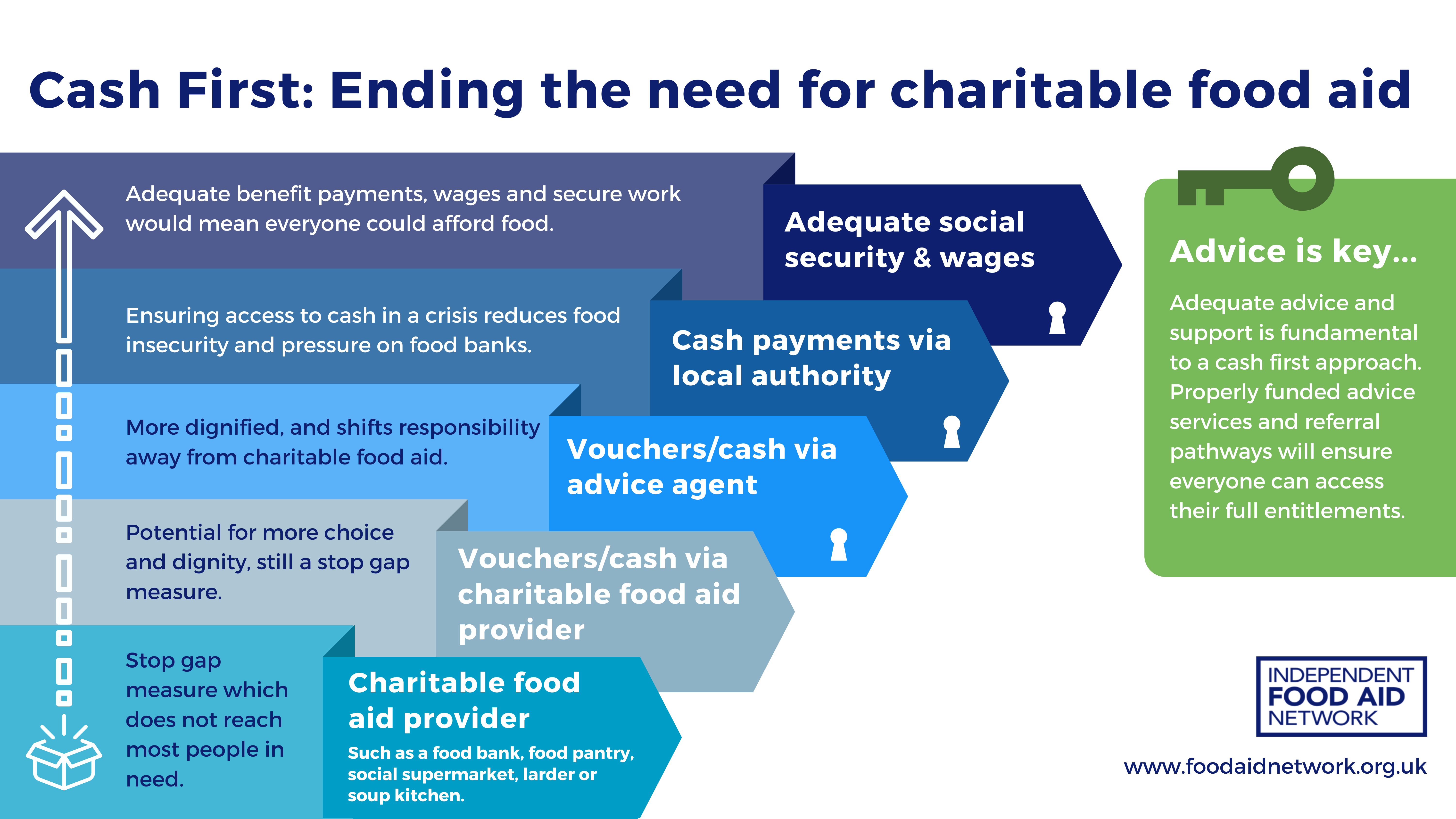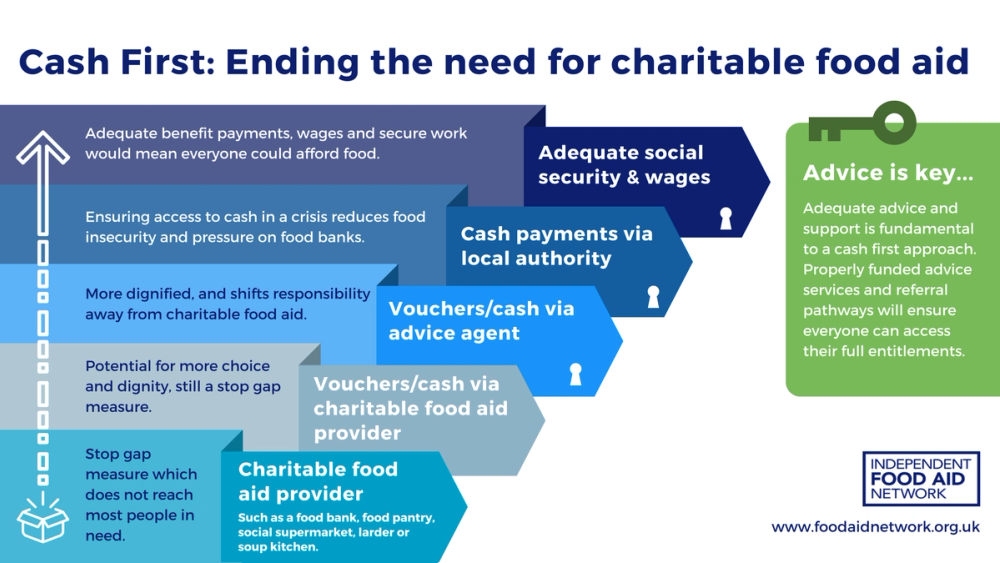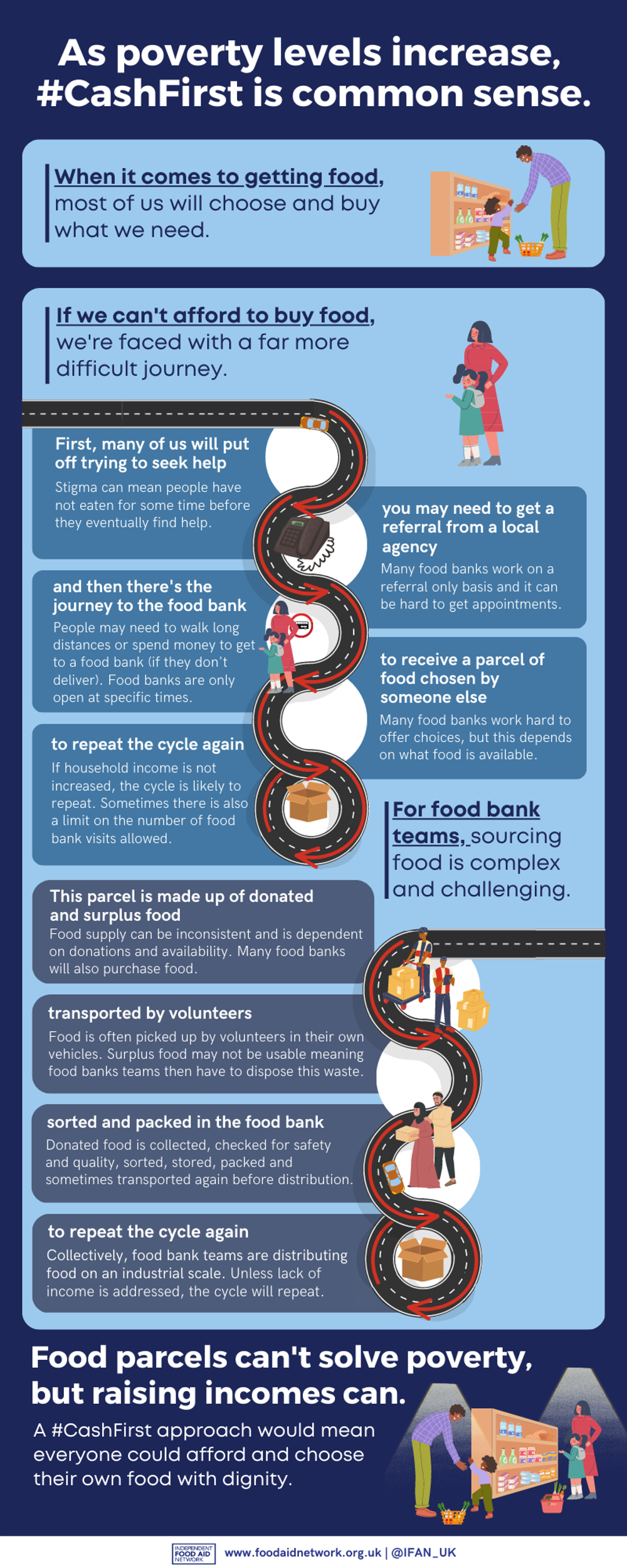
Taking a cash first approach to food insecurity
Explanations, evidence, and resources linked to taking a cash first or income-focused approach to food insecurity.
Introduction
What do we mean by cash first?
Ultimately a cash-first or income-focused approach to food insecurity would result in everyone in our society being in a position to access a Living Income and a Healthy Standard of Living for All through a well-functioning social security system and sufficient wages. Social security payments would be adequate and easy to access while local crisis support via cash payments would be available in every UK local authority.
At UK-wide level, taking a cash-first approach to food insecurity means increasing social security payments to match the cost of living while ensuring fair work and adequate wages become the norm. UK Government data tells us the £20 uplift to households on Universal Credit during the pandemic reduced severe and moderate food insecurity by 16%.
Meanwhile, it's fundamental within a well-functioning social security system that there are easy-to-access, adequate, and well-promoted crisis support payments in cash distributed via local authorities alongside advice and support to maximise income.

Taking a cash first approach to food insecurity at a local level in the current context of inadequate social security payments, absent or sparse local authority-run cash first crisis support, and insufficient wages means prioritising cash first or income-focused interventions whenever possible alongside advice and support to maximise income and build financial resilience.
Cash first support delivered by charitable food aid providers can make a real difference and build momentum for systemic change but it’s clear that, in the long run, providing an effective social security safety net and ensuring the adequacy of wages is in the remit of UK-wide, national, and local governments alongside the critical help and support of both local authority and third sector advice providers to maximise people's incomes and access entitlements.
The effectiveness of a cash first or income-focused approach to tackling growing food insecurity was first highlighted in Scotland through the work of the A Menu for Change project (2017-2020). The term cash first was first coined by the project and epitomises the notion that the answer to food poverty is increasing incomes rather than distributing 'sticking plaster' emergency food parcels - so cash first not food first.
The 'Worrying About Money' resources project, which promotes a cash first approach at local level, was expanded from Scotland into England in the Autumn of 2020 and now covers over 130 UK local authorities. Meanwhile, cash first pilots run by both local authorities and third sector groups have become commonplace across English local authorities demonstrating that most people prefer to be supported via cash payments rather than through food or vouchers. A broad coalition of anti-poverty charities now champion a cash first approach in their calls for the systemic policy changes needed to reduce and eliminate food insecurity.
On this page
Cash first
In Scotland
The effectiveness of a 'cash first' or income-focused approach to tackling growing food insecurity was first highlighted in Scotland through the work of the 'A Menu for Change' project (2017-2020). The Scottish Government committed to a cash first approach to food insecurity in 2022 and published their plan towards ending the need for food banks in Scotland in 2023. As part of this plan, eight cash-first partnerships have been delivering cash first interventions locally in Scotland and an interim evaluation of this work was published in July 2025.
The Scottish Welfare Fund is a key element within the plan and other efforts to reduce the need for food banks and other forms of charitable food aid in Scotland. Following the A Menu for Change report Strengthening the Safety Net and Trussell and Save the Children’s report Tackling Child Poverty and Destitution: Next Steps for the Scottish Child Payment and the Scottish Welfare Fund, the Scottish Government published an independent review in March 2023 followed by new statutory guidance published in April 2025.
Since 2023, IFAN and Trussell have run a series of Cash First Communities conferences in Glasgow focused on local cash first practices in Scotland. Trussell has also been running a Pathways to Advice and Cash Project in five local authority areas in Scotland aimed at improving access to and engagement with cash and advice.
Citizens Advice Scotland has run two food insecurity pilots which have involved distributing shopping vouchers and cash payments alongside advice and support at the point of crisis. CAS is currently running a new Roots out of Crisis project.
Further reading
Cash First
Local government responses to food insecurity in England
Easily accessible, well-promoted, and adequate crisis support delivered via cash payments have proved to be effective in reducing food insecurity at a local authority level. Twinned with help and advice to maximise income cash payments made at a time of crisis can be transformative in helping to build financial resilience. Many local authorities in England have used various iterations of the Household Support Fund to distribute cash payments directly to people facing financial insecurity sometimes in addition existing local welfare assistance schemes. The new Crisis and Resilience Fund in England has to potential to transform how people in crisis are supported in England from April 2026 through the prioritisation of a cash first approach.
Further reading
Cash First
Local third sector interventions
Developing local cash first approaches helps to build momentum for policy changes upstream while providing more dignity and choice for people struggling to afford food and simultaneously reducing the burden on overstretched food aid teams. Cash first approaches delivered by third sector charitable food aid partners can make a real difference in the here and now but, in the long run, providing an effective social security safety net and ensuring the adequacy of wages is the purview of UK-wide, national, and local governments.
Further reading
Cash First
Building financial resilience and the role of local advice services
Local advice and support to help people maximise their incomes and access any existing entitlements is vital both in the here and now as well as the long term. Latest data from Policy in Practice finds that £23 billion in social security payments and social tariffs goes unclaimed. Helping people to build financial resilience while avoiding building debt and falling into crisis is fundamental and epitomises a cash first approach to food insecurity. Finding ways to share easily accessible information on local advice and support, promoting resources as far as wide as possible into communities, and investing in existing local advice services help to prevent people from needing food banks and other charitable food aid aid providers in the first place.
Cash First
Disentangling the food waste and food poverty problems
As many of us wrote in a letter to The Observer in March 2023: ‘While the expansion of organised surplus food redistribution might seem like a win-win solution, this practice fails to reduce food waste levels while undermining policies designed to address food insecurity.’ It’s clear that a charitable food aid response to poverty cannot provide more than a sticking plaster on the problem of poverty while the redistribution food waste to food banks and food pantries entrenches that modus operandi.
Keeping the food poverty and food waste problems distinct is the first critical step in tackling the root causes of both and taking a cash first approach to food insecurity epitomises this differentiation.
Cash First
Outside of the UK
Cash transfers have long proved to be the most effective form of support when delivering humanitarian aid overseas as well as within other international contexts.
"Cash transfers are an effective way of directly helping some of the poorest and most vulnerable people in the world, and are good value for money...They empower the poorest and most vulnerable people to make their own decisions, and enable them to spend it in their own communities." The Department for International Development, 2017
Further reading
Cash First
Blogs and articles
The concept of cash first or income-focused solutions to food insecurity have been explored in numerous blogs and articles.
Cash first
Infographics
IFAN has produced numerous infographics to explain and clarify cash first concepts.
Events
Cash First Communities conferences
IFAN has collaborated with Trussell to co-run Cash First Communities conference focused on local cash first practices in Scotland and South West England.
Cash First
Infant food insecurity
Parents/carers struggling to feed their infants need cash first support.
Further reading
Cash First
FAQs
Questions frequently asked taking a cash first approach to food insecurity:
IFAN's vision is of a country without the need for charitable food aid where adequate and nutritious food is affordable to all. IFAN calls on governments, cross-sector partnerships, and frontline agencies to prioritise a cash first approach to food insecurity putting income-focused policies at the heart of their responses to food insecurity.
Please do get in touch with us at admin@foodaidnetwork.org.uk if you'd like to share resources or evidence linked to taking a cash first approach to food insecurity and if you have any questions.
Where next?
Follow our work
One timely email each quarter and we'll never share your details
Find out more about our privacy policy

